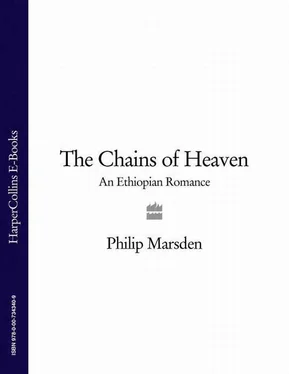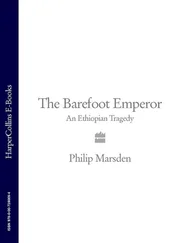Out of nowhere, a man leaps into the midst. His matted hair swings from side to side. He dips his cross-staff above his head. His movements are fluent and precise. A grin splits his skull-like face. The boy has stopped dancing. He is standing still, buffeted and jostled by those around him. He is staring at the man, and his eyes are wide with fear and amazement.
No force on earth could stop this. The man is revolving around the drummers. Sweat flicks from his hair. Deep below
the ground, the hollowed-out chapel is filled with drumming, filled with clapping, filled with ululating, and it all merges in a fever of sound and movement and devotion.
Then it is over. The drummers are lifting the kebberos over their heads. The debtaras ‘ sistra tinkle as they set them down. Two priests are involved in a hissed argument, flicking through a psalter. The shapes on the floor are re-forming themselves. The man with matted locks has disappeared.
Outside again, dawn is a pale loom above the trench. It is still cold. From the distance comes the sound of a tirumba, the funereal horn—and a cry: ‘ Citizens of Lalibela! Come out—come out! Come and help bury the body of Colonel Melaku. Citizens of Lalibela, come out, come out! ‘
Lalibela is a town to die in. The tunnels that once linked the complex of churches are clogged with centuries of corpses. To make a pilgrimage to Lalibela eases your later passage to heaven—but to die here is much better. The soil itself is sacred, and those who take the journey are buried in shallow graves.
The site has never been conclusively dug by archaeologists. Scholars know by heart the handful of significant written references to it. It is easier to list what is not known about Lalibela than what is. It is not known precisely when the churches were carved, whether they were started during the thirteenth-century reign of King Lalibela or much earlier. Nor is it known where all the excavated rock was deposited, nor if any outside expertise was responsible. Nor why, deep in the mountains of Lasta, the Herculean task of chipping out these eleven churches and their labyrinth of link trenches was undertaken. Like Ethiopia itself, it is a timeless place, veiled by layer upon layer of mythologies.
The town’s earlier name of Roha is linked perhaps to al-Ruha, Arabic for the holy city of Edessa which was lost to the Christians just before the reign of King Lalibela. Then again it was the heir of the holy city of Aksum, believed by Ethiopians (never shy in their myth-making) to be Zion itself. So Lalibela took on something of the aura of Aksum and Zion, and thereby of the holiest of all earthly places, Jerusalem. King Lalibela himself was taken on a dream-tour of Jerusalem by the Angel Gabriel and was able to replicate its sites. Pilgrims therefore needed to go no further than Lalibela to earn God’s favour.
The yearning for Jerusalem has haunted generations of Ethiopians—a yearning amplified by its extreme risks. Wild animals, pirates and Muslims have combined in the imagination of Ethiopian Christians to create an über -threat for all those daring to leave the mountains. In the eighteenth century Queen Mentuab wailed to James Bruce that, after thirty years on the throne, she would give up everything if only she ‘could be conveyed to the church of the Holy Sepulchre in Jerusalem, and beg alms for my subsistence all my life after’. Jerusalem was where it all began for Ethiopian kingship, where the union of Solomon and Sheba took place and from where Menelik I acquired the Ark of the Covenant, dancing before it like King David.
So Lalibela became a Biblical Land in miniature. Here is Golgotha, Cana and Nazareth. Beneath Calvary is the Tomb of Adam. I had skirted the slopes of Mount Tabor, Mount Sinai, crossed the River Jordan and climbed the Mount of Olives. In the compound of Beta Maryam, I had bent to smell the single rosebush from the Garden of Eden. Beside the church of Beta Giorgis is a slope of un-dug rock which is Mount Ararat.
Lalibela carries with it a weighty cargo of symbolism—not a place for the literal-minded. It made me think of Robert Southey’s comment after once visiting William Blake: ‘Blake showed me a perfectly mad poem called Jerusalem, ’ he reported. ‘Jerusalem is in Oxford street!’
It was a lovely morning. A few high clouds drifted in a clear blue sky. I passed the fresh grave of Colonel Melaku, where a mound of stones covered his body. An olive-wood cross rose at one end, and on it was nailed a crude plaque: Colonel Melaku Fetem born 1935 EC died at 61. The wreath of marigolds and mimosa was already wilting in the heat.
I was on my way to see a bahtawi. A churchman in Addis had given me the name of Abba Gabre-Meskal. ‘He may be there or—’ the churchman dropped his voice—‘he may have already vanished. ’
I was in luck. I found him up a dusty alley, sitting outside his own lean-to. He was stitching a patch into his qamis, his anchorite’s shawl, dyed yellow (the Ethiopian monks use for this yellow the native plant Carthamus tinctorius, or ‘bastard saffron’). I sat on a stool opposite him and, as I tried to read the wrinkles of his cheek, asked if he knew anything about the dead colonel.
‘Colonel Melaku? He was my neighbour. Very religious man. He came to Lalibela for his death. He was a Derg colonel.’
‘But the Derg were against the Church?’
‘The Derg were devils! Some of the top ones, they just kept it hidden—they prayed in private. ’
Abba Gabre-Meskal was pleased by the thought, and a smile spread across his weathered face. The smile became a chuckle, and the chuckle became a cough—and the cough bent him in two. During the last rains, pneumonia had forced him down from the mossy cave where he had lived for ten years. I offered him water. He drank it in short sips. I didn’t want him vanishing on me.
He was a tall man. He had deep-set eyes and skin like oxhide. His expression swung between comic innocence and holy rage. He raised the yellow qamis to his face to examine his stitching.
‘You a Christian?’
‘Of sorts,’ I said.
‘Protestant?’
I nodded.
‘Luther, Luther!’ He was sewing with quick, even stitches, even though he could hardly see. ‘Tourist?’
‘Yes. I’m going to Aksum. On foot,’ I added, for effect.
He wasn’t impressed. ‘Tell me, have you ever heard of a place called Jerusalem?’
I told him I had lived for a time in a monastery in the Old City.
Leaning down to gnaw through the thread, he looked at me properly for the first time. He folded the qamis and put it to one side. He laid his hands together in his lap, drew a big breath and, for an hour or more, captured me with a long and beautiful story about his own attempt to reach Jerusalem.
Abba Gabre-Meskal had begun his career at a religious school in the Gondar region. One day a fellow student died. The memhir called everyone together and said: ‘One of our brothers has died suddenly. Something is not right.’
They agreed that it was a punishment from God. It made them uneasy because they did not know what they had done wrong, and they couldn’t tell what would happen next.
‘We must make a pilgrimage,’ the memhir said. ‘Someone must go to Jerusalem, without shoes.’
A senior monk was chosen as leader and two others appointed to go with him. Young Abba Gabre-Meskal was one of them. They took with them the Psalms of David, a Book of Hours and gourds for water.
‘We set off with our faith. We put our trust in the will of God.’
They had no shoes.
In Tigray they came to the palace of Ras Seyoum. At the gates were many people—the sick, the poor and the needy. But the pilgrims’ leader was a well-known monk and Ras Seyoum himself came down to see him.
Читать дальше











